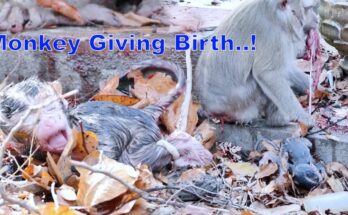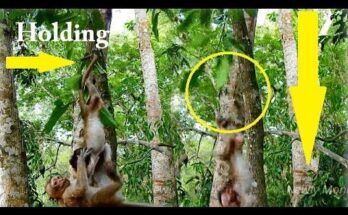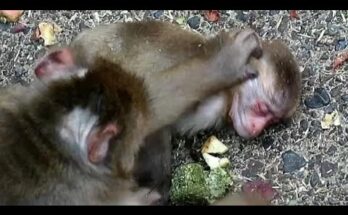The heart-wrenching story of a newborn baby monkey rejected by its own mother paints a vivid picture of the harsh realities some animals face in the wild or captivity. From the very first moments after birth, the baby monkey, fragile and vulnerable, longs for the warmth, comfort, and protection that only a mother’s love can provide. However, in this tragic tale, the mother monkey turns away, refusing to accept her newborn, leaving the little one exposed to danger, cold, and loneliness.
Mother monkeys, like many mammals, have strong maternal instincts that usually ensure the survival of their offspring. They nurse, groom, protect, and nurture their babies with unwavering dedication. But in some cases, this natural bond fails to form. The reasons for maternal rejection can vary widely: the mother might be inexperienced, stressed, or suffering from illness; she might perceive the newborn as weak or defective; or environmental factors such as scarcity of resources or threats may cause her to abandon the infant.
In this heartbreaking scenario, the newborn baby monkey is left confused and distressed. It attempts to cling to its mother, seeking the security and nourishment vital for survival, but the mother remains distant and cold. The refusal to accept the baby leaves the infant exposed to the harsh elements and vulnerable to predators or other dangers within its environment. Without the essential first milk, or colostrum, the baby’s immune system is severely compromised, making survival even more uncertain.
This rejection also disrupts the baby’s social development. In monkey societies, the mother’s care is critical not only for physical survival but for teaching essential social skills, grooming habits, and communication within the troop. A baby monkey deprived of this early nurturing may face difficulties integrating later into its group, leading to isolation and further hardship.
The emotional toll on observers is profound. Witnessing a tiny creature, full of life and hope, being abandoned can stir deep empathy and concern. It raises urgent questions about intervention and care—should humans step in to rescue and rehabilitate the orphaned baby? In sanctuaries and rescue centers, dedicated caretakers often provide round-the-clock feeding, warmth, and companionship, simulating the mother’s role as best as possible. Yet, despite all efforts, nothing can truly replace the natural bond between a mother and her child.
The story of a rejected baby monkey serves as a poignant reminder of nature’s fragility and unpredictability. It underscores the importance of protecting vulnerable wildlife and preserving habitats that support healthy, stress-free environments for animal families. It also highlights the delicate balance between intervention and respect for natural processes—while human help can save lives, it is equally important to understand the complex dynamics at play in the wild.
Ultimately, the tale of this newborn monkey’s rejection is a call for compassion—both toward animals facing such tragedies and for the broader efforts to ensure the survival and well-being of endangered species. It challenges us to reflect on the bonds of motherhood, the instincts that govern life, and the responsibility humans bear as stewards of the natural world.


